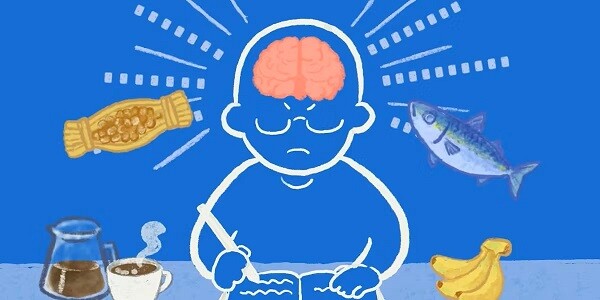The brain undergoes significant growth and development during this period, forming essential neural connections. The nutrients a child receives directly impact their future learning abilities, cognitive functions, and emotional development. Thus, providing proper nutrition through food is vital for a child’s brain health.


5 Brain-Boosting Foods to Include in Your Child’s Daily Diet
Fish Prevents Brain Cell Degeneration
Fish is a popular brain-boosting food, rich in DHA, often referred to as “brain gold.” DHA improves memory and cognitive functions while preventing brain cell degeneration and slowing down the aging process.
Additionally, fish is a great source of lean protein, calcium, and healthy fats, offering numerous health benefits.

Proper nutrition is key to a child’s brain development.
Eggs Promote Brain Development
Eggs are a complete protein source, containing essential nutrients like lecithin, triglycerides, and cholesterol. These play a crucial role in nerve development, promoting brain growth and enhancing memory.
Including eggs in your child’s diet regularly can provide them with the necessary nutrients to boost their memory and overall brain health.
Milk Encourages Neural Growth
Milk is an excellent source of protein, calcium, and essential amino acids that the brain needs. Calcium, in particular, is easily absorbed by the body and is crucial for brain metabolism.
Additionally, milk contains vitamin B1, which is beneficial for neural health.

Milk is packed with brain-boosting nutrients.
Peanuts Prevent Brain Aging
Peanuts are rich in lecithin and cephalin, essential for the nervous system. They help slow down brain function decline, inhibit platelet aggregation, and prevent brain blood clots.
Studies indicate that regular peanut consumption can improve blood circulation and enhance memory.
Walnuts Fight Alzheimer’s Disease
The wrinkles in walnut meat resemble the human brain’s left and right hemispheres, leading many to believe that regular walnut consumption can nourish the brain and enhance intelligence.
Walnuts are rich in unsaturated fatty acids, which help lower cholesterol levels. They are also a good source of vitamins B and E, known for their anti-aging properties and memory-enhancing benefits.
However, due to their high oil content (65-70%), it is best to consume walnuts in moderation, with a small handful (3-5 nuts) being sufficient.

Avoid These 3 Foods That May Hinder Brain Development
Research has found that excessive consumption of trans fats can increase “bad” cholesterol (LDL) while decreasing “good” cholesterol (HDL) levels, raising the risk of cerebral atherosclerosis and sclerosis.
In fact, a diet high in trans fats is associated with memory decline. Studies have shown that healthy men who consumed more trans fats performed worse on memory tests.
To ensure your child’s brain stays healthy, it’s best to limit the following foods.

Limit your child’s intake of junk food.
Junk Food
Junk food, such as cakes, candies, and sweets, are appealing to children as they quickly satisfy hunger and provide a quick energy boost. They also offer a variety of flavors, from sweet to savory, catering to children’s taste preferences.
However, these foods contain harmful trans fats. While small amounts can be processed by the body through physiological reactions, prolonged consumption can lead to harmful build-up in the bloodstream.
This affects blood circulation and significantly increases the risk of cardiovascular and cerebrovascular diseases. Additionally, trans fats can cause inflammation and raise bad cholesterol levels in the body.
Fried Foods
Fried foods like french fries, fried chicken, and other fast-food options are calorie-dense and can lead to rapid weight gain in children if consumed frequently.
These oily foods increase the digestive burden on the stomach and intestines. The saturated fats and trans fats in these foods can elevate bad cholesterol levels, contributing to cardiovascular risks.
Moreover, young children with developing digestive systems may experience discomfort, bloating, and fatigue after consuming fried foods.

A well-nourished body supports a healthy brain.
High-Sodium Foods
High-sodium foods, including fast food, snacks, and processed foods, are becoming increasingly common in children’s diets. While sodium is essential for the body, excessive intake can negatively impact brain development.
One of the most noticeable effects is high blood pressure, which not only affects cardiovascular health but also puts strain on the brain.
Research indicates that high sodium levels can negatively impact the nervous system, altering brain structure and function, leading to impaired learning and memory retention.
How Many Minutes of Napping is Enough to Recharge and Boost Your Health?
“Taking a nap is a great way to recharge during the day, but how long should you sleep for optimal health? This is a question on many people’s minds, as they strive to balance their busy schedules with their health and well-being. A quick power nap or a longer slumber – what’s the ideal duration for a midday siesta?”






































